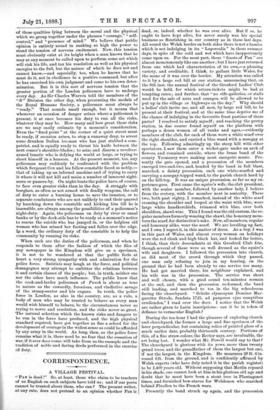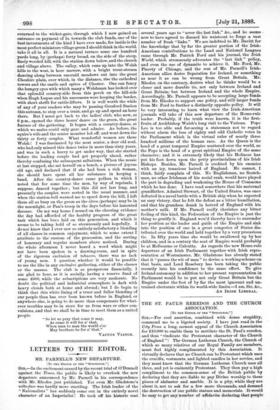CORRESPONDENCE.
A VILLAGE FESTIVAL.
Pan- is dead !" So, at least, those who claim to be teachers of us English on such subjects have told -as ; and if our poets cannot be trusted about them, who can ? The present writer, at any rate, does not pretend to an opinion whether Pan is dead, or, indeed, whether he was ever alive. But-if so, he ought to have kept alive, for never surely was his special business so flourishing in our country as in these last days. All round the Welsh border on both sides there is not a hamlet which is not indulging in its " Lupercalia " in these summer days, in spite of the cold and wet which have inopportunely come upon us. For the most part, these " feasts of Pan " are almost monotonously like one another ; but I have just returned from one which had characteristics of its own,—a pleasing variety, and creditable, I think, to gallant little Wales, for the scene of it was over the border. My attention was called to it by a large red bill at our station, announcing that, on the 9th inst. the annual festival of the Gresford Ladies' Club would be held, for which return-tickets might be had at tempting rates ; and further, that " no rifle-galleries, or stalls used for the sale of nuts and oranges, will be allowed to be put up in the village or highways on the day." Why should a ladies' club invite me, and all men, by large red bill, to be present at their festival, and at the same time deprive me of the chance of indulging in the favourite feast pastime of these parts? I resolved to satisfy myself; and reaching the pretty station, in due course found myself on the platform with perhaps a dozen women of all ranks and ages,—evidently members of the club, for each of them wore a white scarf over the right shoulder, and carried a blue wand with a nosegay at the top. Following admiringly up the steep hill with other spectators, I saw them enter a wicket-gate under an arch of flowers, and remained outside, where the brass band of the county Yeomanry were making most energetic music. Pre- sently the gate opened, and a procession of the members emerged two-and-two, and, headed by the band in full blast, marched, a dainty procession, each one white-scarfed and carrying a nosegay-topped wand, to the parish church hard by on the hill-top. It was an unique procession, so far as my ex- perience goes. First came the squire's wife, the club president, with the senior member, followed by another lady, I believe from the rectory, with the member next in seniority. These two, both past eighty, I remarked, instead of the white scarf crossing the shoulder and looped at the waist with blue, wore large white handkerchiefs, trimmed with blue, over both shoulders, shawl-wise. This I found was the old custom, the re- gular members formerly wearing the shawl, the honorary mem- bers the scarf, for distinction's sake. Now, all members, regular and honorary alike, wear the scarf. We are levelling up fast, and I own I regret it, in this matter of dress. As a boy, I was in this part of Wales, and almost every woman on holidays wore the red cloak and high black hat, and looked far better, I think, than their descendants at this Gresford Club fete, though several of these were as well dressed as the squire's wife and daughters. I followed the procession into church, as did most of the crowd through which they passed, one man only refusing to join in my hearing, on the ground that he had been already to one service too many. He had got married there, his neighbour explained, and his wife was in the procession. The service was short and well chosen, with a good sound ten-minutes sermon at the end, and then the procession re-formed, the band still leading, and marched to tea in the big schoolroom facing the churchyard. " Scholar elymosynEe Domino) Mar- garettte Strode, fundata 1725, ad pauperes ejus sumptibus erudiendos," I read over the door. I notice that the Welsh are rather given to Latin inscriptions : can it be in token of defiance to vernacular English P During the tea-hour I had the pleasure of exploring church and churchyard, the former a large and fine specimen of the later perpendicular, but containing relics of painted glass of a much earlier date, probably thirteenth century. Portions of this, of a fine straw-colour, the Rector says, are invaluable, the art being lost. I wonder what Mr. Powell would say to that ? The churchyard is glorious with its yews, more than twenty grand trees, and the grandfather of them the largest but one, if not the largest, in the Kingdom. He measures 29 ft. 6 in. round 6 ft. from the ground, and is confidently affirmed by Welsh experts (who have duly noted it in the parish register) to be 1,400 years old. Without supposing that Merlin reposed in his shade, one cannot look at him in his glorious old age and doubt that he must have been a stout tree in Plantagenet times, and furnished bow-staves for Welshmen who marched behind Fluellen to the French wars.
Presently the band struck up again, and the procession returned to the wicket-gate, through which I now gained an entrance on payment of ls. towards the club funds, one of the best investments of the kind I have ever made, for inside is the most perfect miniature village green I should think in the world, take it all in all. It is a natural terrace some one hundred yards long, by (perhaps) forty broad, on the side of the steep, finely wooded hill, with the station down below, and the church and village above. The valley, which runs up into the Welsh hills to the west, is here narrow, with a bright trout-stream dancing along between emerald meadows out into the great Cheshire plain, over which, in the distance, rise the cathedral towers and the castle and spires of Chester. One can fancy the hungry eyes with which many a Welshman has looked over that splendid country-side from this perch on the hill-side when Hugh Lupus and his successors were keeping the border, with short shrift for cattle-lifters. It is well worth the while of any of your readers who may be passing Gresford Station this autumn, to stop over a train, and go up and spend an hour there. But I must get back to the ladies' club, who now, at 6 p.m., opened the three hours' dance on the green, the great feature of the gathering. It began with a country-dance, at which we males could only gaze and admire. As before, the squire's wife and the senior member led off, and went down the thirty or forty couples. What wonderful women are these Welsh ! I was fascinated by the next senior, a dear old soul, who had only missed this dance twice in more than sixty years, and was in such a hurry to get under way, that she started before the leading couple had got properly ahead, rather thereby confusing the subsequent saltation. When the music at last stopped, she sat herself on a bench, a picture of joyous old age, and declared that if she had been a rich woman, she should have spent all her substance in keeping a band. After the country-dance came polkas, in which I noted that for some time the men, by way of reprisals, I suppose, danced together ; but this did not last long, and presently the couples were sorted in the usual manner, and when the station-bell warned me to speed down the hill, I left them all as busy on the green as the elves (perhaps) may be in the moonlight, or Pan's troop in the days before his lamented decease. On my way home I mused on the cheering evidence the day had afforded of the healthy progress of the. great task which has bees laid on this generation, and which it seems to be taking hold of so strenuously and hopefully. I do not know that I ever saw so entirely satisfactory a blending of all classes in common enjoyment, which to some extent I attribute to the custom of the procession, and the sorting
of honorary and regular members above noticed. During the whole afternoon I never heard a word which might not have been spoken in a drawing-room, and in spite of the rigorous exclusion of tobacco, there was no lack of young men. I question. whether it would be possible to see the like in any exclusive gathering, either of the classes
or the masses. The club is as prosperous financially, I am glad to hear, as it is socially, having a reserve fund of some £600, while the subscriptions are very moderate. No
doubt the political and industrial atmosphere is dark with heavy clouds both at home and abroad; but I do begin to think that this white lining of a truer and fuller blending of our people than has ever been known before in England, or
anywhere else, is going to do more than compensate for what- ever troubles may be in store for us from wars or other con- vulsions, and that we shall be in time to meet them as a united people. " So let us pray that come it may, As come it will for a' that, When man to man the world o'er May brothers be for a' that."
VACIIIIB VIATOR.



































 Previous page
Previous page